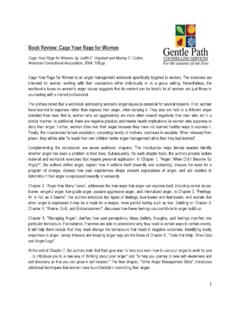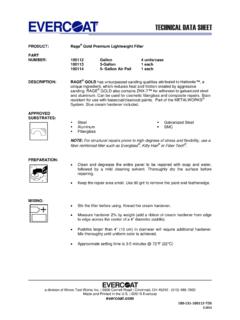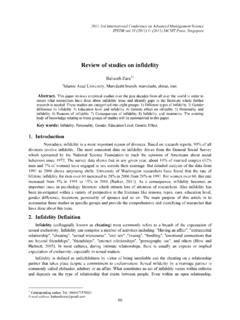Transcription of Episodic Dyscontrol -Intermittent Explosive Behavior -Rage ...
1 Episodic Dyscontrol -Intermittent Explosive Behavior -Rage Attacks Neurology 7645 Wolf River Circle Germantown, TN 38138. (901) 572-3081 Fax: (901) 572-5090. Anger is common in children. They show their anger by pouting, back-talking, yelling or throwing temper tantrums. Fortunately, most children learn to control their tempers. But anger can be a serious problem for a child with ADD, Tourette's Syndrome Learning Disabilities, Oppositional Defiant Disorder or Depression. How can parents help? Intermittent Explosive Behavior (IEB), also called Episodic Dyscontrol Syndrome (EDS), Be consistent (every day the rules are the same). Write is a disorder that causes severe anger down three to five rules that the parents agree to (such as outbursts.)
2 The patient has a very low frustra- hitting, no cussing, or no drugs). Be firm but fair. tion tolerance. He becomes angry for little or no cause. During an uncontrollable rage, he Ignore his temper outbursts, if at all possible. But let may destroy toys or beat up kids or parents. him know you do not approve of his rage attacks. If you An episode can last over 30 minutes. After see him getting frustrated, distract him before he gets ward, the patient is often exhausted and sleeps. mad. Suggest going outside, playing a game, watching a He may be sad about his anger outburst or not video, having a snack, etc. understand why he got so mad. When he is not angry, many of these patients are calm and When the patient is out of control, send him to a quiet pleasant to be with.
3 Place where he can cool down. After the tantrum is over then talk about why he got upset and what can be done Anger originates in a deep about it. Yelling when he is in a rage attack does no part of the brain called the good. limbic system. During a rage episode, the Avoid spankings. Spankings only make a child with norepinephrine increases, Episodic Dyscontrol more angry. And it teaches the child which in turn causes the that you can hit when you get mad. Use restrictions and breathing rate, blood time outs instead. pressure, and heart rate to increase. An EEG (brain Stay calm! If your child destroys things during a rage wave test), or an MRI, scan may be abnormal attack, then they must "pay-back" with money, chores in children with EDS.
4 (like cleaning their brother's room), or writing an "I'm sorry" letter. Rarely Episodic Dyscontrol can be caused by damage to the limbic system (like a brain Censure your child's TV, video games, books, and tumors, a stroke or head injury). Another cause music. Children that are raised on violent music and of EDS is a child born to a mother who drank video games tend to be more violent and angry. Watching excessively or took cocaine while she was violence may teach them that violence is a normal way to pregnant with that child. Episodic Dys-control, solve our problems. as well as the anger associated with abuse or criminal Behavior tends to run in families. Love, understanding and honest praise is critical.
5 Catch Environment certainly plays a part. A child him being good and praise him for it. Increase one-on- who is raised in an atmosphere of intolerance, one time with your child. Listen to your child's problems violence and criticism is much more likely to and concerns. Show your child that you can control your have a violent temper. temper. Information . for kids Avoid stress It is not wrong to be Be positive. Say to angry. But ask yourself, I can. Don't yourself: Is this really say I can't, it never something to get mad works, I'm stupid, or about? Will getting mad his is dumb. If a toy fix the problem? If the frustrates you, try to answer is no, then yell figure it out.
6 Read the at your self: STOP. directions! Ask others for Laugh at yourself. Think of a funny joke or story. help. Trust others. Have a friend you can talk to. being positive will help you to feel less angry. Walk away. Bite your tongue to keep your mouth Get organized. The more your life is organized, the less shut. As Thomas Jefferson said, Count to 10, if very frustrated you'll be. You won't lose your homework, tapes, angry, count to 100. Squeeze your fist or an exercise or keys. Set out your clothes the night before. Write on a ball. Find something to hit like a punching bag, or a posted calendar all important appointments. bean bag. Use a tennis racket to hit a ball against a wall.
7 Have a block of wood with nails in it, then when Don't wait until the last minute. Don't put things off. you're mad, hammer the nails into that block of wood. When you get into a rush you'll probably forget Chop wood, dig a hole, play the piano, shoot some something and get mad because you can't find it. Arrive baskets, take a hot bath, spend some time with a pet early for an appointment. Do your homework, book dog or cat. Try anything to get your mind off what reports, & chores now. Putting them off just makes you makes you mad. (and your parents) more frustrated and angry. Listen. The reason we have two ears and one mouth To forgive is divine: Try to forgive those who make you is be cause we are suppose to listen more and talk mad.
8 Let go of your anger. Staying angry only makes you less! Try to understand a parent's, friend's and more frustrated and angry. Never go to sleep mad. sister's point of view. Meditate: Practice 10 minutes every day breathing Other thoughts deeply through your nose counting to 10. Then breath Family and child counseling will out through your mouth counting to 10. Concentrate help the family deal with anger and only on your breathing. Feel yourself relaxing. Then learn effective parenting skills for when you start to get mad, start your deep breathing dealing with angry children. Join a exercise. To help, try focusing on a picture or clock in support group. the room. Medication can help many children Eat a good breakfast.
9 Get at least eight hours of control their anger. Commonly used medicines include sleep every night. Avoid caffeine, cigarettes and drugs Tegretol, Depakote, Lamictal Pamelor, and Risperdal. (especially cocaine and anabolic steroids). Don't drink alcohol. Alcohol is the preventable cause of rage attacks. Do aerobic exercise for 20 minutes, three to five Suggested Reading times a week. This includes walking, running, swimming laps, bicycling. Football and base ball aren't Anger Kills: Seventeen Strategies for Controlling the really aerobic exercises. Regular exercise helps to Hostility That Can Harm Your Health control your temper. by Redford Williams Keep a journal: Write down what made you angry, where you were, when, who was there, what you were Healthy Anger: How to Help Children and Teens thinking, what actions you took and how you would Manage Their Anger.
10 By Bernard Golden, PhD. act in the future in similar situations. The Angry Child: Regaining Control When Your Child Is Out of Control. by Timothy Murphy, PhD. Written by Don Eastmead, , and edited by Drew Eastmead, June 2004.






